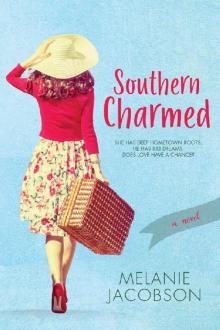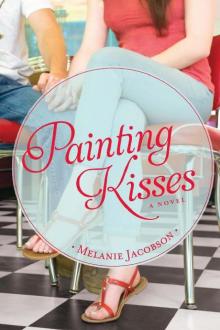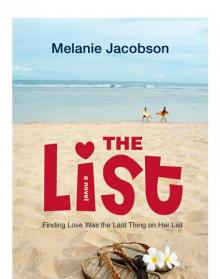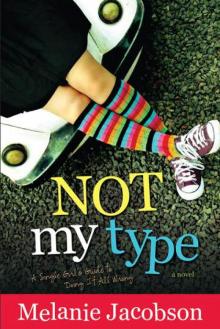- Home
- Melanie Jacobson
Southern Charmed Page 2
Southern Charmed Read online
Page 2
Mom stepped back out, intent on getting more dishes to wash. This time I was determined to escape him. “I’ve got it,” I said, lifting the half-empty pot of étouffée from the table. “I mean it. I’ve sat all afternoon between church, meetings, and dinner. I want to move.”
She lifted the pot from my hands. “You two go on a walk. Take Max to the pier. It’s a beautiful evening.”
The time had changed the week before, giving us an extra hour of daylight, but we weren’t even close to long, lazy evenings of mellow sunset. It was already dusk, and lights winked on across the lake every few minutes. “It’s too dark,” I said.
“Don’t be silly. Your daddy and I loved sitting there, watching everyone’s lights come on. It kind of reminds me of stars. Go on ahead. I don’t mind doing the dishes.”
I couldn’t stare her down with Max standing right there, so I smiled as I figured out how to get around her. “Would you like to go on a walk, Max?” It was the perfect chance for him to excuse himself to go home.
“Sure.”
“I unders—wait, you do want to go on a walk?”
“Yeah. Sounds relaxing. When my mom calls tonight, she’ll be happy to hear I did something besides work and sleep.”
I slid my shoes off and set them beside my chair. “You’re probably going to want to do this barefoot. It’s muddy down by the water, and I wouldn’t want you to mess up your church shoes.”
Undeterred, he slipped his shoes off and tucked his socks inside them.
Great.
Chapter 2
We took the three stairs down from the deck to the yard and the brick path leading to the water. My dad had put the path in, and I frowned at the grass poking up between the pavers. Taking care of the property had been the boys’ job, but with both of them gone, Mom and I split the work. It was a big yard, and I could see where we had fallen behind, especially since she rarely had the energy to stay on top of her sections.
Max sighed. “Did I do something else wrong?”
I glanced at him, and he imitated my frown. I shook my head. “Do you always assume when someone in your vicinity is annoyed that it’s your fault? Because that probably says more about you than you’d like it to.”
His eyebrow shot up. “Excuse me if I was off base with that one, but you’ve been taking everything I say as an insult, so I’m trying to be proactive here.”
“Taking everything you say as an insult,” I repeated as I picked up my pace so we could get to the pier and get the walk over with. “Can’t imagine why I’d do that.”
He was quiet, but he stayed right behind me. We were almost to the water before he spoke. “I deserved that. I was a punk when I was a kid. I can promise I’m not like that anymore.”
It startled me to hear him refer to himself as a punk, echoing my thoughts from dinner. I didn’t know what to say, so I stayed quiet.
“I mean it, Lila.” His voice was quiet but so insistent that I stopped and turned to look at him. “I know I was a jerk back then. But that’s the thing—I was a kid who got moved to a new place in the middle of junior high. And Louisiana feels more like a foreign country than a state.” I tensed, and he rushed to explain. “I mean, that’s how I saw it when I was a kid. I’d never been anywhere besides Philly and Utah, and Baton Rouge is nothing like either of them. I missed my school and my friends and my cousins, and I felt like I couldn’t catch a break here.”
“You never gave any of us a break either,” I said.
“I know. I’m not trying to defend myself. But college, a mission, grad school—that stuff knocks all the stupid out of you if you let it.”
Amen to that. “And you let it?” A burning curiosity to know if he remembered and regretted all of his jerk moves swept over me, but I wasn’t going to bring up the dance. I had a feeling it was the kind of thing that got seared into the memory of the victim while it faded for the perpetrator.
“I tried to.”
I considered that and nodded, turning back to the path to pick up our walk, but I was less determined to outpace him now. He fell in step beside me, and I decided I could forgive him enough to ignore him and listen to the frogs instead. It was a step up from the chafing irritation I’d experienced since the first Sunday he’d shown up at church and I’d figured out who he was.
He had been an annoyingly good-looking teenager, and he’d grown into a sexy man. He was a half foot taller than when he’d moved away, and the skinny boy I remembered had become a well-sculpted piece of eye candy with broad shoulders, a strong jaw, and Ian Somerhalder cheekbones. The mess of black curls on his head had been tamed into a well-groomed haircut. If it weren’t for his eyes, I might not have recognized him.
Those eyes though . . .
They reminded me of the amber pendant necklace I’d inherited from Mawmaw Bordelon. It wasn’t a color I’d seen before or since, so they’d given him away.
I wondered what else had changed about him. In two years of teaching high school, I’d observed that while sometimes a person’s better nature could win out, often character was fixed. And I had never cared for Max’s character.
Might as well investigate. “You said your mission helped with the rough edges?”
“A hundred percent.”
“And what about college? Did you go to BYU?”
“I kind of want to say no because I wish I could surprise people with something crazy like the Sorbonne in Paris or something. But yeah, I went to BYU.”
“That’s a bad thing?”
“No. I just need a more interesting life story. What about you?”
“I like my life story.”
He grinned. “No. I meant where did you go to college?”
“LSU. I guess that makes me locally grown and harvested.”
“I did that, in a way. I went back to Philadelphia for grad school.”
“Where?”
“Wharton.”
“Business school. So you’re an MBA.”
“I have my MBA.”
The small correction hewed a little too closely to the old Max, who had spent a lot of time policing people’s grammar and pronunciation. I picked up my pace again. “Fine. You have an MBA. You are kind of pretentious.”
“What? No way. That’s why I don’t like saying I am an MBA. MBAs are the worst about that, thinking they’re awesome because they went to business school. Wharton MBAs are the biggest offenders.” He thought about it. “Well, maybe the Harvard MBAs are the worst. But since we’re the top two ranked business schools, guys come out of the program thinking it means something. But I think it’s lame for them to say, ‘I’m an MBA.’ No. False. An MBA is a piece of a paper. As a person, I hope to be more than that. Sorry it came out wrong. I wasn’t trying to correct you or anything.”
Hmm. Not bad. “You used to do that a lot. Correct people. Do you remember that?”
He grimaced. “Yeah.”
“I’m a kind of a jerk for pointing that out. Sorry I jumped to conclusions.”
“This might be the highest apology-to-words ratio of any conversation I’ve ever had. If one of us, mostly me, isn’t apologizing every other sentence, I’m not sure we’re going to have much else to talk about.”
“Sports,” I said. “You used to talk about sports a lot.”
“Still do. How long are you going to keep baiting me?” He looked like he was fighting a smile.
“I don’t know. I was doing it at first because I was having flashbacks of your bad old days, but now it’s just funny, so I may not stop.”
He stood for a moment and stared out to the water, then back at me. “I was thinking of another apology, like if I pushed you into the water right now, how sincere would I have to sound for you to believe it was an accident?”
I busted up laughing. “You have changed. The old Max wouldn’t have thought twice about shoving me into the lake. What else is different about you?” Had his attitude toward Baton Rouge changed? I’d been assuming it hadn’t based on his body language an
d blank face at church, but maybe I was wrong about that too.
“I don’t know. I still love sports, but I acknowledge that LSU football has earned all its glory, and even though I hate the SEC, it’s a good conference.”
“Good conference? The best conference. Say it’s the best conference.”
“I admit that it’s one of the best. That’s all I’m giving you.”
“Go Tigers. Can you give me that? Just a little one? Come on, say it. Go Tigers.”
“Go . . . jump in a lake.”
“Aw, there’s the Max I remember. I’m proud of you. Admitting you have a weak conference is the first step. We’ll turn you into a Tiger eventually.”
“I won’t be here long enough for you to try.”
“What about your job?”
“I’m hoping to move up through the ranks, and that means moving to a bigger office at some point.”
“It’s possible I’m biased, but I don’t see how anyone could spend two months in Baton Rouge and ever want to leave.”
“You’re definitely biased.”
“I thought you were reformed.”
“I am. I’m not making fun of it. I kind of like it here.”
That warmed my heart, and the surge of good feeling bothered me; it was hope, because suddenly I wanted to flirt with him as if he were any new guy in the singles branch. But the few new guys who came to the ward were usually at LSU for law school or some other grad program, and most of them were from the South, if not from somewhere else in Louisiana. If I gelled with one of them, our future made sense. They got where I came from and why I’d never leave it. My roots wouldn’t survive a transplant. I needed someone else who was rooted here too.
I was so far past dating for fun. I’d thought I would get married way before twenty-four, and I’d tried. But all of my girlfriends from church were married, most with at least one kid, and I presided over a Relief Society full of their younger sisters who were getting engaged.
It was an epidemic. Even the ones who went on missions were getting married within six months of returning. I’d almost say it was something in the water, but I drank that water too, and I hadn’t even been on a date in six months. Though I’d never had a lot of options to start. Baton Rouge had only three wards, not counting our small student one, which was nothing for a city our size, so we maybe graduated ten active LDS boys a year from high school. In the entire city. And most of them went off to church colleges if they could get in. The ones who stayed for jobs or went to LSU got engaged pretty quickly. The older I got, the more the options narrowed.
Having a hot guy my age with a great career ahead of him show up at church had probably looked like a sign to Mom. It was a bad cosmic joke that it had been Max.
I cleared my throat. “So. Besides my mom’s étouffée, what do you like about being here this time? Because can I tell you something about yourself?”
“Uh, go right ahead.”
“You don’t look like you love being here when I see you in church.”
“Is that why you never talk to me?”
“I’ve talked to you.”
“I said hello the first Sunday I came, you blinked at me, squinted, and said, ‘I remember you.’ And then you told me to have a nice Sunday, and you walked off. And that’s been it.”
“I thought you were still in your Louisiana-hating mind frame. But if you aren’t, what is that bored look on your face every Sunday?”
“You’re seeing me feel like an idiot because I’m seventy years older than everyone in that ward.”
“Not me. I don’t think you’ve got even two years on me.”
“Fine. But everyone else.”
“I get that,” I admitted. “Last week one of the girls in Relief Society called me Sister Guidry instead of Lila. I’m just Lila!”
“How can I feel old at twenty-six? And somehow every Sunday I do. I’ll work on my face though. Make it less mad looking or something. Think you’ll talk to me on Sundays now?”
“I think I might.” We’d reached the pier. I pointed to Max’s pant hem. “You may want to roll those up. It makes the pier more fun.” He did and followed me to the end, where we sat and dangled our feet in the water.
“So tell me more about liking Baton Rouge,” I said. It had been a long time since I’d felt a tickle of excitement in my chest over a guy, and I prayed that he was going to give me a reason to let it grow.
“It’s funny how much my opinion has changed, but it’s changed about Philadelphia too. I grew up in the suburbs, and my dad did well for himself, so it was a pretty affluent area. Country clubs, big homes behind tall fences. I didn’t go into the city much besides field trips to some of the historical sights. So Baton Rouge was a shock to my system. It sprawls a lot more than Philadelphia does, but it’s got a much smaller business district and a lot of old stuff next to a lot of brand-new stuff, and parts are dirty and run-down and totally unlike what I was used to.”
“But I’d think Philadelphia would have even more of that.”
“Oh, it does. I just wasn’t aware of it until we moved back and I realized that Philadelphia has way more problems with poverty and crime than you guys do.”
“If you’re going to be down here for a while, you’ll probably need to drop ‘you guys’ and practice saying y’all.”
“Y’all.”
“Sounds good on you.”
“Great, except I feel like a fake.”
“Just practice. You were telling me about why Baton Rouge rules and Philadelphia drools.”
He bumped his shoulder against mine, and heat sprang up between us. Oh, that was not good. Or maybe very good?
“I’m telling you why I like Baton Rouge better than I used to. I still like Philadelphia better.”
I nudged him back, and my arm tingled again.
“So what’s Philly got that we don’t?”
He smiled down at me. “You’re on a mission to convert me to Baton Rouge, aren’t you?”
“Yep, you and everyone else. Every missionary who comes here, every family that relocates here for a job, they all get the Lila Guidry ‘Why this is the best city ever’ speech. Is it working?”
“Sorry,” he said, leaning back on his palms. “Philly still has my heart.”
“Then give me the Max Archer ‘Why Philadelphia is the best city ever’ pitch.”
He gazed out at the water. I let him think as I watched the lights across the lake and wondered about the homes and the lives they illuminated. Would someone sitting on the opposite pier have seen our lights two years before and guessed that they burned with fierce grief?
When Max spoke, I’d almost forgotten what he was answering. “Here, people don’t push. I can see the value in that, of taking life a little more as it comes. But I’m used to the hustle. I kind of thrive on that, pushing toward what’s next, making the deal, breaking through to the next level. I know you’re probably about to accuse me of implying y’all are slow-paced because you’re unmotivated, but that’s not it,” he said with a small smile when I bumped him for his y’all. “Do I get a nudge every time I say y’all?”
I nudged him again.
“Y’all are good people, and y’all have a great work ethic. But y’all love it here so much, y’all work hard to figure out how to stay.”
I laughed at all the y’alls, and his small smile grew to a grin. “There’s nothing wrong with staying,” I said.
“Nothing at all. I get it. I also get that I work at a different pace. I’m built more for places like New York or Chicago, where it’s constant striving, pushing, climbing the corporate ladder. Which sounds so dry and boring, but seriously, I was born to go to business school and fling myself into the corporate grind. I know it doesn’t make sense to a lot of people, but I love this stuff. I’m in Baton Rouge learning the operations side of a major manufacturing plant, and I love it. I accept that there’s a weirdo on the pier right now, and it’s not y’all.”
I laughed again. “Y’all is
plural. All y’all is when you mean a bunch of people. One person is still just you. You don’t get points for that one.”
“Fine. Y’all have a great city, I see why you love it, but if you came to Philly, you might see why I like it too.”
I could hear he loved his job in the same way I loved mine, which was odd given how different our work was. But where normally I responded to that kind of passion, whether it was for food or work or music, his words hollowed out my chest, and the tickle of excitement disappeared in the excavation. I liked him as a person, which was a fast one-eighty from finding him on our deck an hour before, but there was no point in liking him beyond that. He wouldn’t put down roots here. Not by a long shot.
We stared out at the water, each with our own thoughts, but it was an easy silence. “This is nice,” he said.
“Yeah. I always feel like that when I’m near water. Lakes, rivers, the Gulf. I don’t know. Put me near water and it’s like someone flipped a switch on my wiring, and I go from wound up to peaceful in minutes.”
“You’re kind of surprising me.”
I tilted my head up to meet his gaze. “How?”
“Whenever I see you, you come across as highly focused, a go, go, go kind of person. I wouldn’t picture you relaxing on a pier. I don’t know if I could do that if I were in your shoes.”
“Why not? Are you intending to do something that should make me nervous?”
“No. I was referring to all the stuff I pulled on you in the past. It’s nice of you not to be suspicious of me after that.” He scrubbed his hand through his hair and looked away for a minute before turning to face me squarely. “There are probably a lot of people I should apologize to for my idiot teenage years, but I’m pretty sure I owe you the biggest apology.”
My muscles morphed from noodles to concrete. The lightness had disappeared between us. “You did apologize. We’re good.”
“I gave you a general apology. But I owe you a specific one. Do you remember that dance when you were fourteen? I think it was your first one?”

 Southern Charmed
Southern Charmed Kiss Me Now: A Romantic Comedy
Kiss Me Now: A Romantic Comedy Painting Kisses
Painting Kisses Wedding Belles: A Novel in Four Parts
Wedding Belles: A Novel in Four Parts The List
The List Not My Type
Not My Type A Timeless Romance Anthology: Summer Wedding Collection
A Timeless Romance Anthology: Summer Wedding Collection